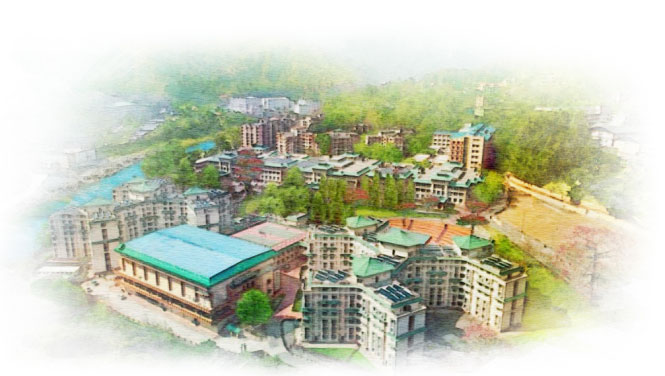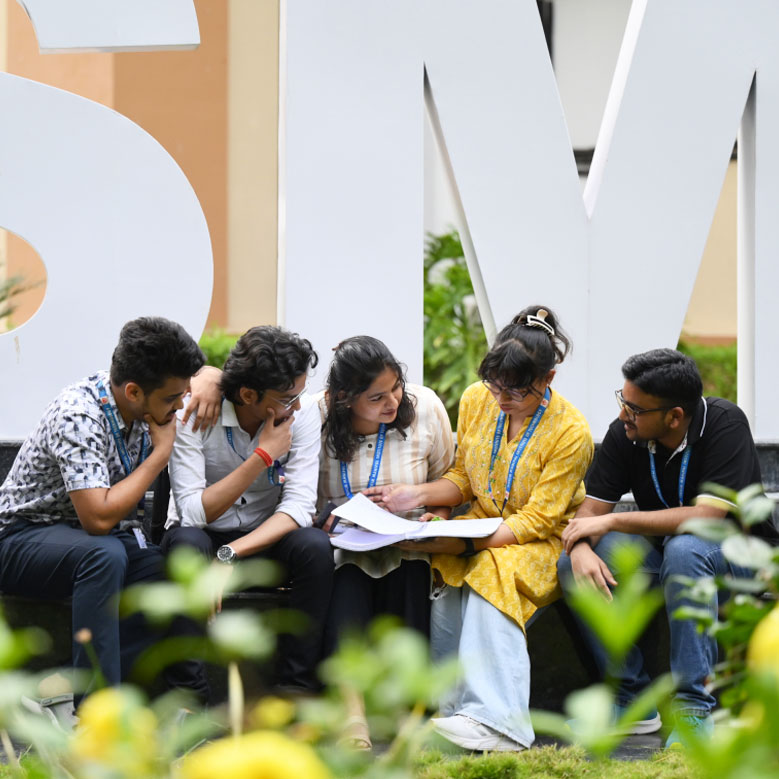DATES TO REMEMBER :
15th March 2026: Last date to apply for admissions
01st August 2026: Course commencement date
Overview
The Department of Civil Engineering at SMIT was established in 2009 and offers Bachelor of Technology (B.Tech Civil Engineering). The Department has well established state-of-the-art, Structural Engineering, Geotechnical Engineering, Survey, Geology, and Environment & Fluid Mechanics Laboratories covering all aspects of Civil Engineering undergraduate courses at par with best Civil Engineering Universities. Students of the Department are being exposed to the latest advancements in design & construction technologies with sufficient field exposures commensurate with Civil Engineering course requirements.

Crafting success
stories with excellence
in education.
ELIGIBILITY
- B.Tech. - 10+2/Equivalent with 45% marks (40% in Reserved Category) in Physics/ Chemistry/ Mathematics.
- B.Tech.[L.E.] - Passed Diploma in any branch in Engineering and Technology with at least 45% marks (40% in Reserved Category) OR BSc with at least 45% marks (40% in Reserved Category) and passed 10+2 exam with Mathematics as a subject OR passed D.Voc stream in the same or allied sector
ENTRANCE EXAMINATION
a) General Category, Defence, North East, Gorkha Territorial Administration (GTA) and Paramilitary Force Categories:
- The candidates will have to appear for the JEE to be conducted by the CBSE.
- Cut-off JEE Main Score in All India JEE applicable to all reserved categories will be displayed on our website
b) Sikkim Category:
- Candidates should apply to the Director, Technical Education, HRDD and Government of Sikkim. They should appear in the entrance test conducted by the Government, the details of which will be notified by the Director, HRDD, Technical Education.
c) SMIT Online Test:
- Candidates seeking admission under this category will have to appear for online test conducted by SMU.
Program FEES
| Fee | Fees For General (Gen), North East (NE), Defence (Def), ParaMilitary Force (PMF) ,GTA & SAARC | Fees For Sikkim Quota Students | Fees For Non SAARC | Fee Structure ofr NRI / Foreign Category |
| Caution Deposit | 10,000 | 10,000 | 10,000 | 10,000 |
| Exam Fees (One time per year) | 3,500 | 3,500 | 5,000 | 3,500 |
| Lumpsum | 3,12,700 | 1,83,500 | 3,90,900 | $7600 |
| YEARLY | Fees For General Category Students | Fees For Sikkim Quota Students | Fees For Non SAARC | Fee Structure ofr NRI / Foreign Category |
| First Year I Installment | 1,62,850 | 95,500 | 2,03,300 | $3900 |
| First Year II Installment | 1,62,850 | 95,500 | 2,03,300 | $3900 |
| Second Year I Installment | 1,62,850 | 95,500 | 2,03,300 | $3900 |
| Second Year II Installment | 1,62,850 | 95,500 | 2,03,300 | $3900 |
| Third Year I Installment | 1,62,850 | 95,500 | 2,03,300 | $3900 |
| Third Year II Installment | 1,62,850 | 95,500 | 2,03,300 | $3900 |
| Fourth Year I Installment | 1,62,850 | 95,500 | 2,03,300 | $3900 |
| Fourth Year II Installment | 1,62,850 | 95,500 | 2,03,300 | $3900 |
- Engineering knowledge: Apply the knowledge of mathematics, science, engineering
fundamentals, and an engineering specialization to the solution of complex
engineering problems.
- Problem analysis: Identify, formulate, review research literature, and analyze
complex engineering problems reaching substantiated conclusions using first
principles of mathematics, natural sciences, and engineering sciences.
- Design/development of solutions: Design solutions for complex engineering
problems and design system components or processes that meet the specified needs
with appropriate consideration for the public health and safety, and the
cultural, societal, and environmental considerations.
- Conduct investigations of complex problems: Use research-based knowledge and
research methods including design of experiments, analysis and interpretation of
data, and synthesis of the information to provide valid conclusions.
- Modern tool usage: Create, select, and apply appropriate techniques, resources,
and modern engineering and IT tools including prediction and modeling to complex
engineering activities with an understanding of the limitations.
- The engineer and society: Apply reasoning informed by the contextual knowledge
to assess societal, health, safety, legal and cultural issues and the consequent
responsibilities relevant to the professional engineering practice.
- Environment and sustainability: Understand the impact of the professional
engineering solutions in societal and environmental contexts, and demonstrate
the knowledge of, and need for sustainable development.
- Ethics: Apply ethical principles and commit to professional ethics and responsibilities and norms of the engineering practice.
- Individual and team work: Function effectively as an individual, and as a member
or leader in diverse teams, and in multidisciplinary settings.
- Communication: Communicate effectively on complex engineering activities with
the engineering community and with society at large, such as, being able to
comprehend and write effective reports and design documentation, make effective
presentations, and give and receive clear instructions.
- Project management and finance: Demonstrate knowledge and understanding of the engineering and management principles and apply these to one’s own work, as a member and leader in a team, to manage projects and in multidisciplinary environments.
- Life-long learning: Recognize the need for, and have the preparation and ability to engage in independent and life-long learning in the broadest context of technological change.
- Inculcating technical competencies in students to deal with real world Civil Engineering problems.
- Building competence and confidence in students to emerge as Civil Engineering expert and entrepreneur.
- Click Here for Course Outcome
- Click Here for Course Syllabus for 2022
- Click Here for Course Syllabus 2023 onwards
- Click Here for Course Syllabus for Earthquake Resistant Structures (Honors) 2022
- Click Here for Course Syllabus for Natural Hazard and Disaster Management (Specialization) 2022
The graduates in Civil Engineering degree play a vital role in fulfilling the societal infra-structural needs and demand. With India being a developing country and one of the fastest growing economies has created wide scope for Civil Engineers.
The Civil Engineering degree course focuses on planning and designing of industrial and residential buildings, hydraulic structure, water supply and sanitation systems and transportation infrastructure.
After the successful completion of course graduates have wide opportunities to work in private and public sectors and industries (L&T, Gammon India, GMR, HCC, ACC, Ultratech, Ambuja, NHPC, NTPC, NHAI etc…). Graduates also have scope for pursuing higher studies and/or research.
Entrepreneurship
Development cell (EDC)
Helps students in exploring entrepreneurial opportunities.

Students are encouraged to engage in practical's making them industry ready

World-class campus in a tranquil environment

Best-in-class laboratories and workshops for practical exposure


